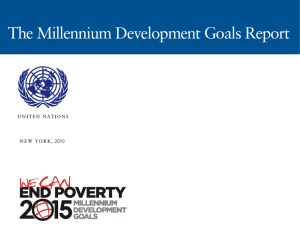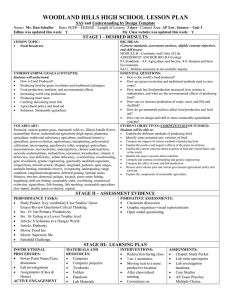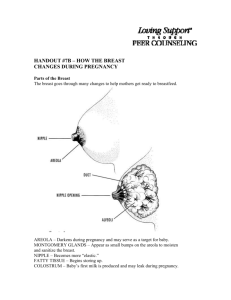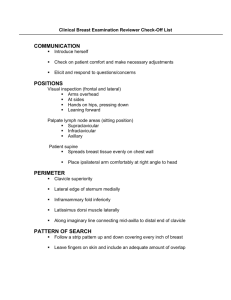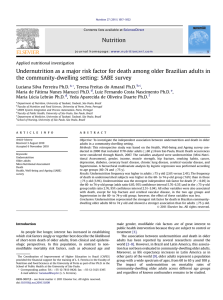Impacts of Undernutrition Text adapted from Leathers & Foster, 2009
advertisement
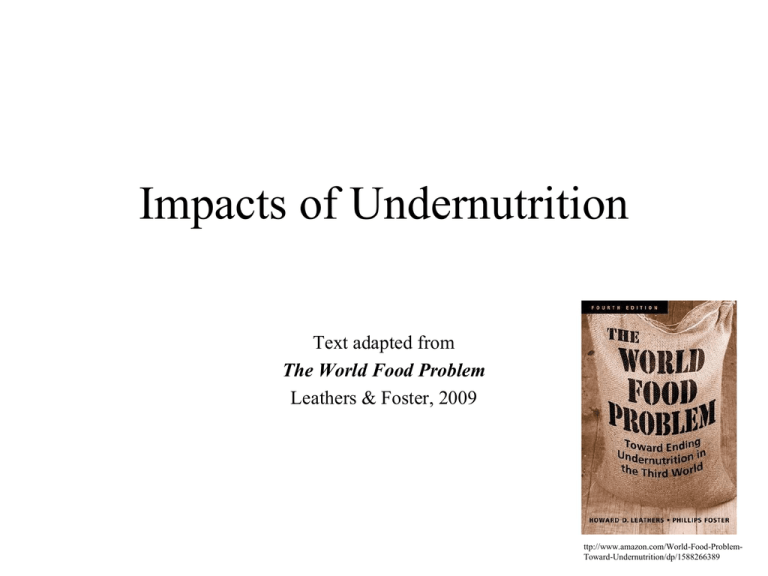
Impacts of Undernutrition Text adapted from The World Food Problem Leathers & Foster, 2009 ttp://www.amazon.com/World-Food-ProblemToward-Undernutrition/dp/1588266389 Low Birth Weight Babies • Born to undernourished mothers – PEM – Iron deficiency • Much more likely to die in first year • Early nutrition in girl’s life can affect baby Delayed Menarche • Undernourished girls produce less estrogen – Associated with body fat • Lower estrogen delays the age of menstruation: – USA: 12.8 yrs old – Rural India: 14.4 yrs old – Rwanda: 17 yrs old Breast Feeding as Birth Control (Lactational Amenorrhea) • Prolactin stimulates breast milk – Also suppresses ovulation • Producing breast milk also reduces fat storage – Thus reduces estrogen – Thus impedes ovulation • Very effective for 6-12 months after birth • Most important form of birth control in developing world http://farm1.static.flickr.com/182/424570275_2152aa84c8.jpg?v=0 Breast Feeding • Improves baby’s health • Contains all nutrients • Fights infection – Antibodies in milk • Guaranteed food supply – No competition with other family members • Sanitary food supply • 1.5 million children in developing world die – because they are not breast fed ftp://ftp.fao.org/wfd/2007/photogallery/pages/en/index_en.htm AIDS and Breast Feeding • Breast milk can pass AIDS virus • More likely if mother has vitamin A deficiency – 32% if deficiency – 7% if normal • Bottle alternative may be less safe – 6x higher risk of death due to diarrhea or respiratory diseases • UNICEF recommends mothers with AIDS to breast feed – for first 6 months Mother and child with AIDS Impact of Undernutrition on Infant Mortality • Probability of dying by age 5 – 15.5% in least developed nations – 0.85% in industrialized nations • Diarrhea leading killer – – – – – Infant Mortality http://host2.equinox.ie/ConnectWorld/procontent/Global_Themes/upload/infantmortality.gif Pneumonia Influenza Bronchitis Whooping cough Measles • Malnutrition – contributes to ½ of these deaths in developing world Impact of Undernutrition on Intellectual Development • Protein supplements given during pregnancy – Improved cognitive function in children through age 6-7 yrs. • IQ reduced by child’s deficiency in – Iron – Iodine – Protein http://www.btbetterworld.com/media/International/images/smiling-african-boy_290.jpg Impact of Undernutrition on Education • • • • • Missed school days Special education needs Low test scores Repeated grades Attention deficit disorder – – – – – http://www.wacm.info/images/Kids%20in%20classroom%20girl.jpg Decreased attention span Impaired memory Disobedience Distractibility Reduced progress Impact of Undernutrition on Labor Productivity • Work capacity drops severely – Calorie deficiency – Iron deficiency • More likely unemployed • Taller individuals – Better nourished – More productive – Stronger http://afe.easia.columbia.edu/china/geog/RicePlowing.gif Undernutrition in the Developing World • 20% of the developing world suffers from undernutrition Madigascar undernourished children http://mongabay.com/music/06/0502unicef.jpg Number of Undernourished Were Dropping • 918 million – 1970s • 906 million – 1980s • 800 million – 2000 • Biggest drop in Asia – 25% drop • Least drop sub-Saharan Africa http://www.satyamag.com/sat.site.images/hunger.jpg – 5% drop Seasonality of Undernutrition • Grain prices lowest right after harvest – Nutrition good • 2,000 Calories/day in Mozambique – Then supplies dwindle • Grain prices highest before harvest – Hungry season • 1,430 Calories/day in Mozambique – Foraging for wild foods • Termites, caterpillars, grasshoppers, locusts Criteria for worst-off countries • Calories/person – D.R. Congo, Burundi, Eritrea, Somalia, Afghanistan, Tajikistan • Child nutrition – North Korea, Afghanistan, Burundi, Eritrea, Somalia • Mortality rates for children – Sierra Leone, Angola, Afghanistan • Low Birth weight babies Rural Bangladesh Women http://www.thp.org/sai00/bangladesh/bangpro.jpg – Bangladesh, Haiti, Yemen, India What Kinds of People are Undernourished? • Rural poor – 65% of people are rural in low income countries • Children – Especially weaning • Pregnant, Lactating women • Girls – Food diverted to brothers http://cache.eb.com/eb/image?id=102981&rendTypeId=4 • Uneducated families • Large families • Elderly
